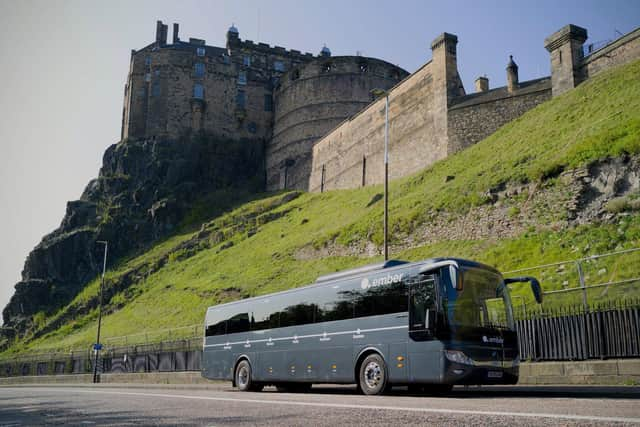Electric coach firm Ember to expand Scottish network with Glasgow-Dundee service followed by Fort William
Ember’s expansion follows the operator launching its debut service between Edinburgh and Dundee in 2020 and stepping up its frequency in February from eight to 14 services a day in each direction.
It is also developing vehicle charging capacity in Fort William ahead of a planned service to and from Edinburgh and/or Glasgow, while Oban is also being considered.
Advertisement
Hide AdAdvertisement
Hide AdEmber’s current fleet of four coaches can accommodate two bikes each free of charge, but it is investigating whether four new coaches acquired for the Glasgow-Dundee route will have space for up to six cycles each.


Co-founder Keith Bradbury said: “We're working on launching a new route between Glasgow and Dundee in early August.
"That will serve smaller towns and villages along the way too.
"Beyond that, we're working on launching more routes across Scotland and want to run a full zero emission network.
"Launching zero emission inter-city services requires capable charging infrastructure and this is something we're working on building in several Scottish cities.
"Once these hubs are live we'll be launching many more services.”
Mr Bradbury said Fort William was also in development, and while there was “no active progress” with Oban, it was also being looked at.
He said Ember’s wider aim was to transform attitudes to coach travel in addition to highlighting its environmental credentials.
Advertisement
Hide AdAdvertisement
Hide AdHe said: “Zero emission is not enough to change the perception and ridership of public transport.
"Doing that takes a deeper layer of technology to provide passengers with a seamless experience, from booking, to travelling, to cancellations and refunds."
Mr Bradbury said the Scottish Government’s target of reducing car kilometres by 20 per cent by 2030 “would only be possible if public transport measures are improved and if the passenger experience of public transport is elevated to something better than the car.
"That's fundamentally what we're working on by combining our technology with zero emission inter-city bus routes.
"An early example of this is our integration with Edinburgh Trams so that our tickets can be accepted onboard their network to allow seamless connections to and from the airport.
"It's a simple concept but it has driven a shift in our customer base towards multi-modal travel as a reliable norm.”
Mr Bradbury said Ember would look for further such link-ups with other zero emission “final mile” providers – Edinburgh’s trams are also electric – on other routes across Scotland.
The developments come as many of Scotland’s bus operators are expanding their electric vehicle fleets, with the world's first hydrogen-powered double deckers, which are also zero emission, being trialled in Aberdeen.
Advertisement
Hide AdAdvertisement
Hide AdScotRail has a target of phasing out diesel powered trains across its network by 2035, with the first stage of electrifying the Edinburgh-Aberdeen line due to start this month as far as the Forth Bridge.
Battery trains are to be developed for the Borders Railway between Edinburgh and Tweedbank, and the Edinburgh-Fife and Glasgow-East Kilbride lines.
Comments
Want to join the conversation? Please or to comment on this article.
